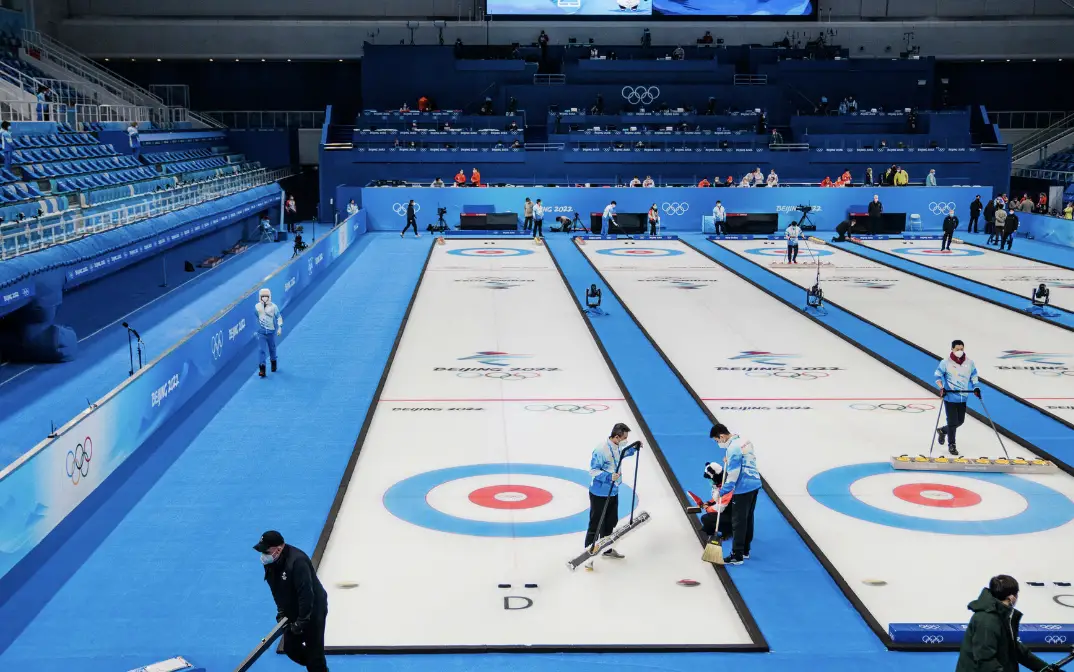Curling, often dubbed “chess on ice,” is a sport that blends strategy, finesse, and teamwork. Like any unique sport, curling has its own vocabulary that might leave newcomers puzzled. Fear not! In this informative blog post, we’re here to demystify the world of curling by explaining the top 50 curling terms and their meanings. Whether you’re a curious observer or an aspiring curler, this guide will help you navigate the terminology of the sheet and stone with confidence.
**1. Sheet: The playing surface of the ice where the game takes place.
**2. House: The circular target area consisting of a center circle (button) and several concentric rings.
**3. Button: The center of the house, often the target for scoring.
**4. Guard: A stone placed in front of the house to block access to the button.
**5. Takeout: A shot intended to hit and remove an opponent’s stone from play.
**6. Draw Shot: A controlled shot aimed at getting the stone to stop in a specific location.
**7. Hammer: The team with the final shot in an end.
**8. Lead: The first player to deliver stones for a team.
**9. Skip: The team’s strategist and captain who determines the shots and communicates with teammates.
**10. Sweeping: Using brooms to control the speed and direction of a stone.
**11. Hog Line: A line that players must release their stones before crossing.
**12. Hack: The foothold where players push off to deliver a stone.
**13. House: The circular target area consisting of a center circle (button) and several concentric rings.
**14. In Turn: A clockwise rotation of the stone for a right-handed curler.
**15. Out Turn: A counterclockwise rotation of the stone for a right-handed curler.
**16. Biter: A stone that barely touches the outer edge of the house.
**17. Burned Stone: A stone touched or moved by a player’s body or equipment.
**18. Eight-Ender: A perfect end where a team scores all eight possible points.
**19. Blank End: An end where no points are scored, and the end is played again.
**20. Bonspiel: A curling tournament or competition.
**21. Button: The center of the house, often the target for scoring.
**22. Delivery: The act of throwing a stone down the ice.
**23. End: A segment of the game in which each team throws eight stones.
**24. Free Guard Zone: The area between the hog line and the house where guards cannot be removed until the fourth stone is thrown.
**25. Hack Weight: A moderate amount of weight used for takeout shots.
**26. Heavy Weight: A powerful shot used to remove multiple stones.
**27. House: The circular target area consisting of a center circle (button) and several concentric rings.
**28. Line of Delivery: An imaginary line from the hack to the skip’s broom.
**29. Nose Hit: A shot that hits a stone head-on.
**30. Peel: A powerful shot intended to remove guards from play.
**31. Promotion: Moving a stone into a scoring position by hitting another stone.
**32. Rock: Another term for a stone.
**33. Runback: A shot that hits one stone and redirects to hit another.
**34. Score: The number of points a team earns in an end.
**35. Second: The player who throws the second pair of stones in an end.
**36. Sheet: The playing surface of the ice where the game takes place.
**37. Skip’s Deuce: A stone placed at the back of the house behind the button.
**38. Slider: A device worn on the sliding foot to glide on the ice.
**39. Split: Dividing the house into two areas by placing a stone between them.
**40. Stone: The granite disc used in curling.
**41. Sweeping: Using brooms to control the speed and direction of a stone.
**42. Tee Line: The line running across the sheet through the center of the house.
**43. Third: The player who throws the third pair of stones in an end.
**44. Through the Port: A shot that navigates through a narrow gap between stones.
**45. Turn: The rotation applied to the stone during delivery (e.g., in turn or out turn).
**46. Vice: The player who throws the fourth pair of stones in an end.
**47. Weight: The amount of power applied to a shot.
**48. Wide: A shot that travels farther from the intended target.
**49. Wick: A stone that barely grazes another stone on its path.
**50. Zone: The different sections of the house (e.g., 4-foot, 8-foot, 12-foot).
Conclusion: Speaking the Language of the Ice
Curling’s unique terminology is like poetry on ice, reflecting the artistry and strategy that make the sport so captivating. With this guide to the top 50 curling terms and their meanings, you’re ready to step onto the sheet with newfound confidence. Whether you’re watching from the sidelines or sliding stones yourself, you’ll be able to communicate and appreciate the intricacies of curling’s language. So, embrace the sweep, master the draw, and revel in the camaraderie that comes with speaking the language of the ice. Happy curling!
